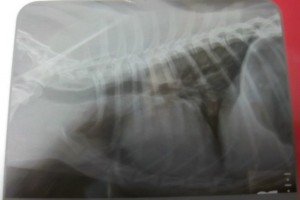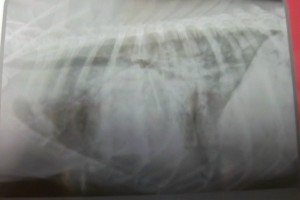
Heart disease is one of the most common diseases that affect small breed dogs that we see at the Welland Animal Hospital (ex Chihuahuas, Toy poodles, Cavalier King Charles spaniels, Pekinese, Shih Tzu,….) Some estimates suggest 1/3 of small dogs over the age of 10 may be affected with heart disease caused by mitral valve disease. The mitral valve is located between the left atrium and left ventricle and when functioning normally forms a perfect seal preventing blood from flowing backwards (into the left atrium) as the ventricle contracts and pushes blood forward to the rest of the body. When this valve is defective some blood will leak backwards which eventually leads to heart enlargement and decreased blood being pumped in a forward direction.
Most dogs with mitral valve disease will initially have few if any clinical signs. Initially a heart murmur detected by your veterinarian during a routine physical exam may be the only sign of mitral valve disease. A murmur is the result of turbulent blood flow which occurs across the faulty valve and is easily detected with a stethoscope during a routine physical examination. Heart murmurs are graded from 1-6 depending on their severity. If a heart murmur is detected your veterinarian may suggest one or more of the following depending on the number of clinical signs noted 1) frequent physical exams to monitor your pet 2) chest radiographs to determine heart size (baseline) and appearance of lungs (signs of respiratory disease – bronchitis vs pulmonary edema ….), 3) bloodwork to assess for other diseases (kidney function, liver disease, heartworm disease…), 4) an EKG (electrocardiogram) – if an abnormal rhythm is heard, and 5) cardiac BNP (blood test which becomes elevated as the heart enlarges) 6) ultrasound of the heart – useful if the diagnoses is complicated, can visualize the abnormal flow across the valves and measure chamber size.
Below is a lateral chest radiograph of a normal dog
Above is a lateral chest radiograph of a dog in heart failure (coughing, difficulty exercising..) with an enlarged heart and evidence of pulmonary edema (base of heart and caudal lung lobes)
Some dogs will continue to show no clinical signs of heart disease for months to many years after a heart murmur is first detected, while other dogs may progress more rapidly. Common clinical signs associated with progressive heart disease include the following: progressive cough – especially at night, difficulty breathing, difficulty exercising, restless at night – difficulty sleeping, increased heart rate, irregular heart rate, poor appetite, weight loss, and fainting spells – syncope to name a few.
There is to date no cure for heart failure caused by mitral regurgitation but medications can reduce the symptoms and improve the quality of life as well as the life expectancy of most dogs. Medications frequently used to treat heart failure include diuretics (furosemide) to decrease fluid accumulation in the lungs, vetmedin (pimobendan) to increase strength of heart contraction and dilation of blood vessels, and ACE-inhibitors which improve the blood flow through vessels.
Heart disease is a chronically progressive disease that can be effectively treated for varying lengths of time. It is essential to give medications as instructed and to recheck with your veterinarian should you notice any change in your dogs clinical signs or as recommended by your veterinarian. A proper diet lower in sodium is also beneficial as is a proper exercise regime.





